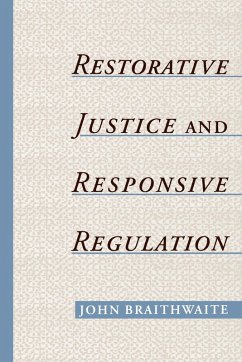Braithwaite's argument against punitive justice systems and for restorative justice systems establishes that there are good theoretical and empirical grounds for anticipating that well designed restorative justice processes will restore victims, offenders, and communities better than existing criminal justice practices. Counterintuitively, he also shows that a restorative justice system may deter, incapacitate, and rehabilitate more effectively than a punitive system. This is particularly true when the restorative justice system is embedded in a responsive regulatory framework that opts for deterrence only after restoration repeatedly fails, and incapacitation only after escalated deterrence fails. Braithwaite's empirical research demonstrates that active deterrence under the dynamic regulatory pyramid that is a hallmark of the restorative justice system he supports, is far more effective than the passive deterrence that is notable in the stricter "sentencing grid" of current criminal justice systems.
Restorative Justice has become an important new way of thinking about crime, responsive regulation an influential way of thinking about business regulation. In this volume, John Braithwaite brings together his important work on restorative justive with his work on business regulation to form a sweepingly novel picture of the way society regulates itself.
Hinweis: Dieser Artikel kann nur an eine deutsche Lieferadresse ausgeliefert werden.
Restorative Justice has become an important new way of thinking about crime, responsive regulation an influential way of thinking about business regulation. In this volume, John Braithwaite brings together his important work on restorative justive with his work on business regulation to form a sweepingly novel picture of the way society regulates itself.
Hinweis: Dieser Artikel kann nur an eine deutsche Lieferadresse ausgeliefert werden.








